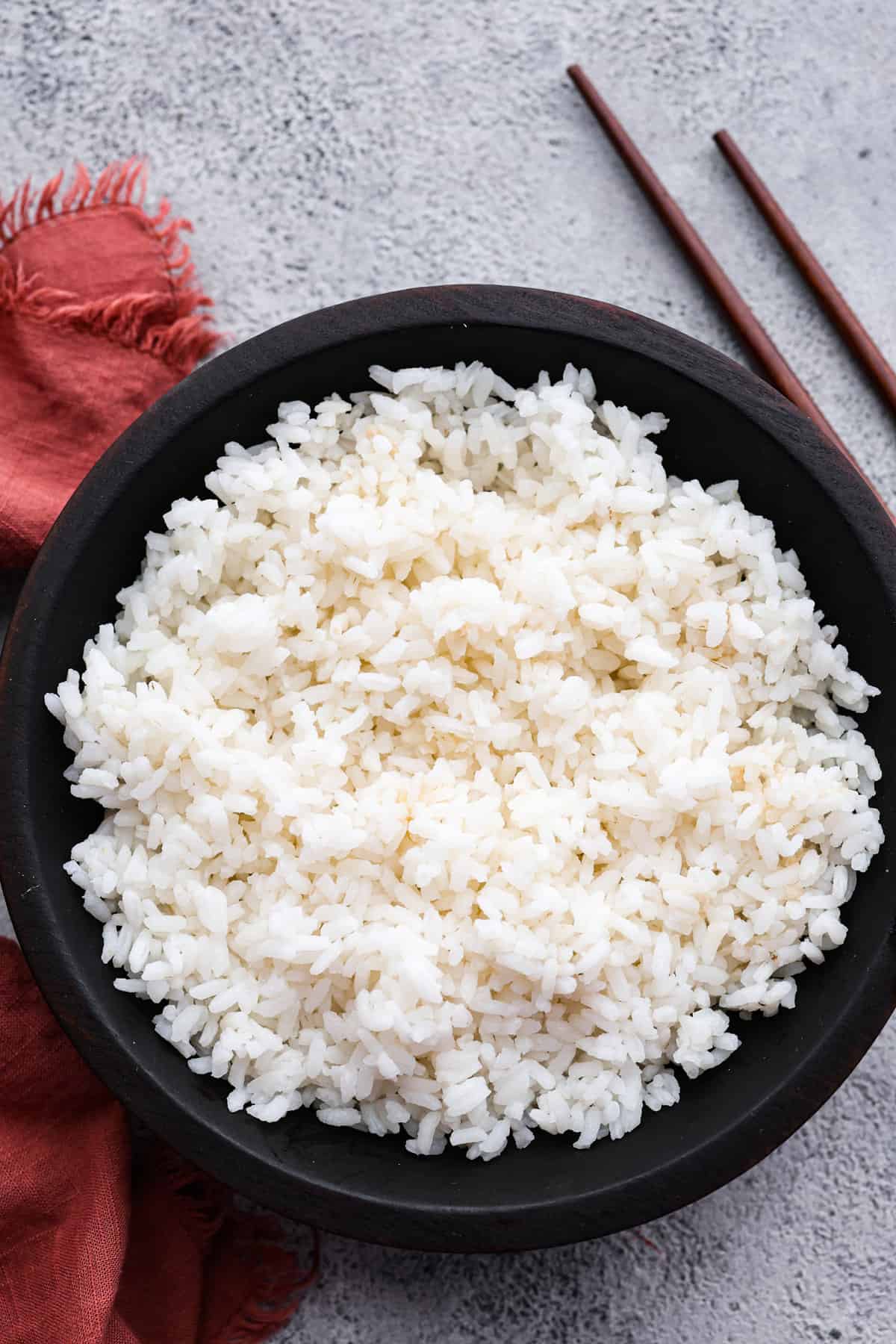This website may contain affiliate links and advertising so that we can provide recipes to you. Read my privacy policy.
If you are obsessed with sushi like I am, it’s time you learned to make Sushi Rice at home! It’s so sticky and delicious, and easier than you may think. Impress your friends with a sushi night in!
I am such a huge fan of sushi. It definitely grew on me over the years. I couldn’t imagine eating raw fish as a kid, now I eat sushi any chance I get. And it really is super fun to make at home. You don’t have to make this sushi rice just for sushi! You really can make this for any dish, it’s perfectly sticky and delicious rice that goes great with Vegetable Stir Fry, a Korean Ground Beef and Rice Bowl, or Grilled Teriyaki Chicken.
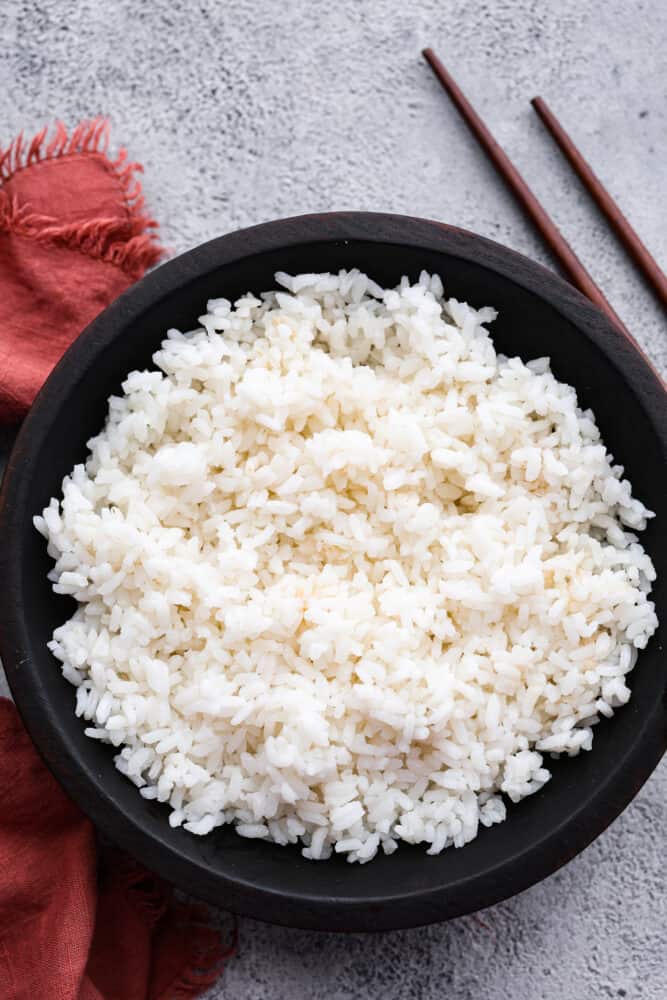
What is Sushi Rice?
So you may be wondering, what makes sushi rice different from regular rice? Well, for starters, you absolutely have to use short grain rice. Short grain rice has more starch in it, which helps it stick together better. You also add a few more ingredients than regular rice. You will make a mixture of rice vinegar, sugar, and salt to pour over the rice once it’s cooked. This helps it soak up extra moisture and flavor. This way it will stick together better when you are rolling your sushi.
You don’t have to stick to just sushi with this rice though! I love this rice served with a lot of different dishes. Of course it’s perfect for sushi rolls, but it’s also great with a poke bowl or a salmon rice bowl, and especially spam musubi! You still get most of the same flavors of sushi without the extra work of rolling it up. I think this rice is a great skill to have in your back pocket because it really always impresses people! Sushi rice just tastes better than regular white rice if you ask me.
Ingredients
Sushi rice has a few more ingredients than traditional rice. That is how it becomes so perfectly sticky and delicious! The key ingredient is short grain rice. Long grain rice like basmati , or medium grain rice, don’t have enough starch in them to get sticky. So double check your rice before trying this recipe! You can cook it in an instant pot, rice cooker, or a regular pot on the stove. You can find the measurements below in the recipe card.
- Short Grain or Sushi Rice: You are looking for Japanese style short grain rice which is sometimes labeled sushi rice. I like Nishiki brand or Kokuho Rose, and you should be able to find both at your local grocery store. You will want to get short grain rice because it will make all the difference in this rice turning out sticky and perfect for sushi
- Japanese Rice Vinegar: This is just a regular bottle of rice vinegar. You don’t have to get the ones labeled specifically for sushi. In fact, those kinds usually have added sugar and salt in them, so I stay away from them because I like to add those ingredients on my own.
- Granulated Sugar: This helps the rice become sticky, and it also gives it great flavor. Feel free to use another sweetener if you want to!
- Salt: To help bring out all of the flavors in the rice.
- Water: For cooking the rice.
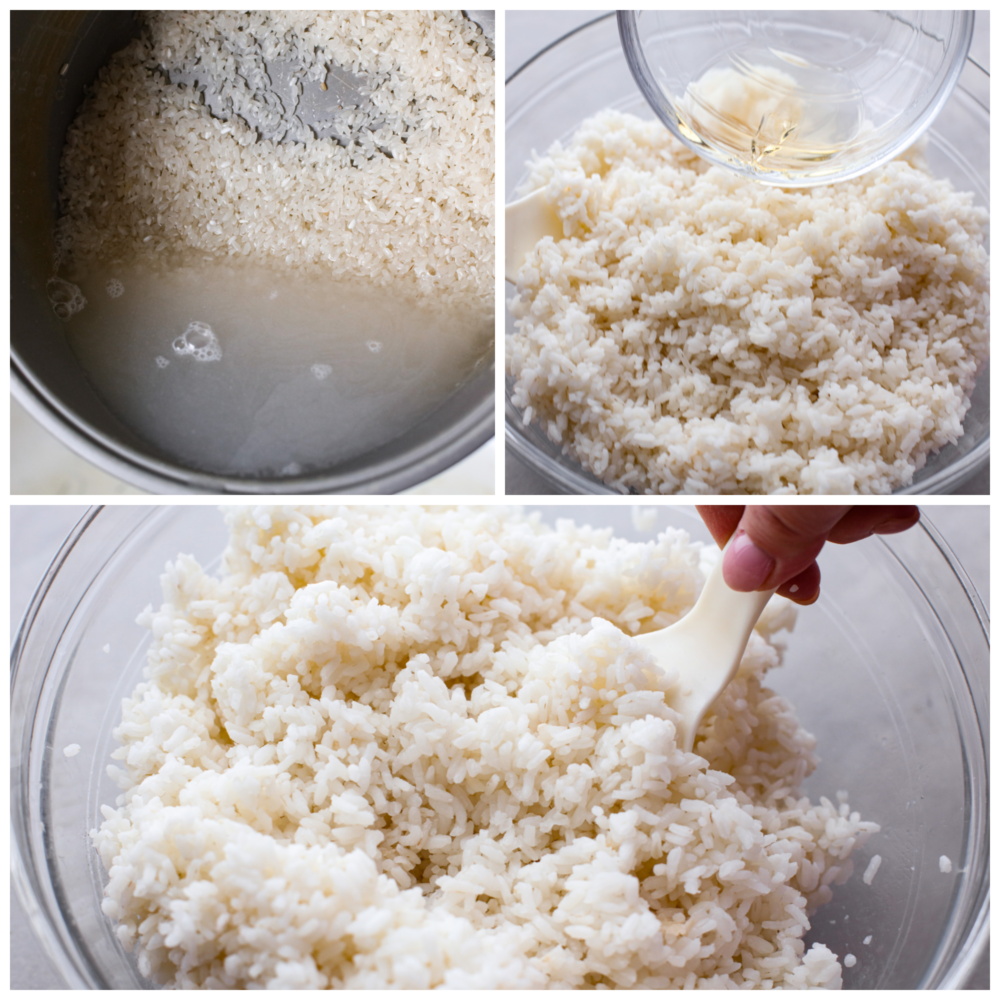
Sushi Rice Recipe
I’ve found the easiest way to rinse your sushi rice is to put it in a fine mesh strainer and hold it under running water until the water runs clear. It’s just easier than trying to rinse and repeat in a bowl. Make sure to drain your rice well before adding it to the pot for cooking. I always use my instant pot because cooking short grain rice over the stove can be a lot harder than it needs to be. Once your rice is cooked, then add the rest of your ingredients. The best tip I can give is to fold gently. You don’t want to stir in a circle because you will end up smashing a lot of your rice together. Put your spatula into the rice at an angle and fluff it upwards until the vinegar is coated evenly on all the rice.
- Rinse: Rinse the rice with cold water until the water runs clear.
- Cook: Cook the rice on the stovetop, in a rice cooker, or in the Instant Pot. If you use a rice cooker or Instant pot, cook the rice according to the manufacturer’s instructions. My rice cooker takes 4 cups of water to cook 3 cups of rice.
- Heat Sugar and Vinegar: While the rice is cooking, add the rice vinegar, sugar and salt together in a small saucepan. Heat over medium-high heat and whisk until the sugar has dissolved.
- Add Sugar Mixture to Rice: Transfer the cooked rice to a large mixing bowl. Pour the vinegar mixture over the rice and use a spatula to fold the mixture into the rice.
- Cover and Cool: Cover the bowl with saran wrap and let the rice cool on the counter until it reaches room temperature.
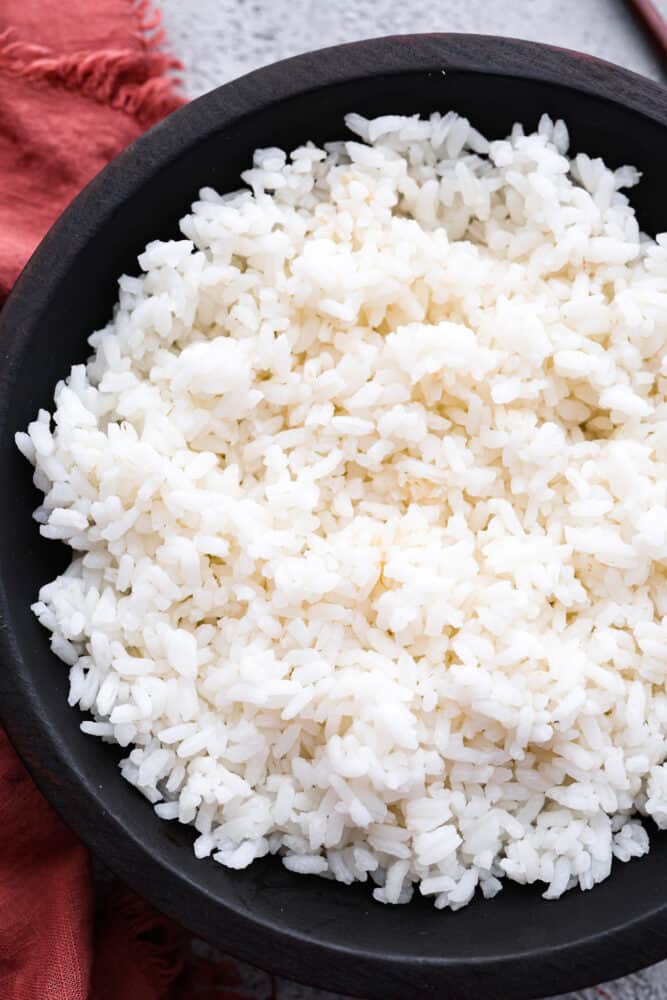
Tips for Making Sushi Rice
I share a lot of my personal tips for making sushi rice throughout this post, so make sure to read through the whole thing! There isn’t much to this sushi rice recipe, but you do want to get the textures and taste perfect, so these little tips can make all the difference.
- Rinse Well: Make sure to rinse the rice in cold water a few times until the water is clear. This helps remove the starches from the grains of rice, resulting in a less sticky, fluffy rice.
- Soggy Rice: If your rice ends up too soggy, adjust the amount of water next time and use ¼ cup less. This is just kind of a trial and error thing because every stove and cooking method is different. Make sure to follow the cooking recommendations on your rice cooker or instant pot.
- Cover the Rice: I’ve found that covering the rice with plastic wrap works just fine. Some people use a damp kitchen towel and let it rest directly on top of the rice so it doesn’t dry out. Sometimes the plastic wrap can keep the rice a little too wet, so if your rice comes out on the wet side, I would go for the towel instead.
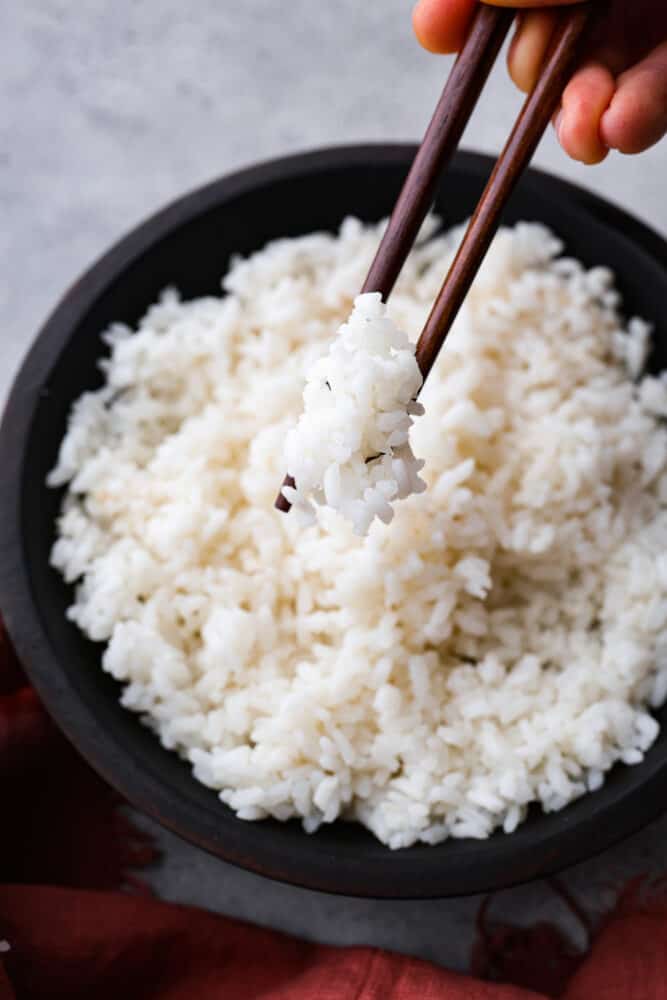
Storing Leftovers
Sushi rice is one of those things that you really should eat fresh. Going through the extra steps to make the perfect rice is definitely worth it when you eat it fresh. If you do have some leftovers, here is how to store them.
- Unseasoned Rice: Cooked, unseasoned rice can be kept in the fridge in an airtight container for 5-6 days.
- Seasoned Sushi Rice: Cooked, seasoned rice is best used right away, but can be stored for 2-3 days in an airtight container in the fridge if necessary.
-
Rinse the rice with cold water until the water runs clear.
-
Cook the rice on the stovetop, in a rice cooker, or in the Instant Pot. If you use a rice cooker or Instant pot, cook the rice according to the manufacturer’s instructions. My rice cooker takes 4 cups of water to cook 3 cups of rice.
-
While the rice is cooking, add the rice vinegar, sugar and salt together in a small saucepan. Heat over medium-high heat and whisk until the sugar has dissolved.
-
Transfer the cooked rice to a large mixing bowl. Pour the vinegar mixture over the rice and use a spatula to fold the mixture into the rice.
-
Cover the bowl with saran wrap and let the rice cool on the counter until it reaches room temperature.
Serves: 4
Calories551kcal (28%)Carbohydrates122g (41%)Protein10g (20%)Fat1g (2%)Saturated Fat0.2g (1%)Polyunsaturated Fat0.2gMonounsaturated Fat0.2gSodium583mg (24%)Potassium114mg (3%)Fiber4g (16%)Sugar3g (3%)Calcium6mg (1%)Iron6mg (33%)
All nutritional information is based on third party calculations and is only an estimate. Each recipe and nutritional value will vary depending on the brands you use, measuring methods and portion sizes per household.


